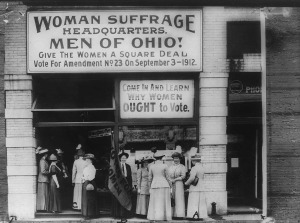 Recently a friend posed the following question on her Facebook page: “What is your definition of ‘feminism’?”
Recently a friend posed the following question on her Facebook page: “What is your definition of ‘feminism’?”
I read several of the responses listed in her comments section and then added my own reply, which is my personal interpretation of the definition found in Webster’s Dictionary: “To me, it (feminism) means that women should have the same education and career opportunities as men. Period.”
While most of the respondents wrote similar definitions to mine, I must admit that I was a bit surprised that some women still find themselves hesitant to identify with the term, feminism, due to perceived negative connotations that continue to accompany a word that strives to promote gender equality.
In order to more thoroughly understand why feminism carries such a vast array of definitions, we must first look at the history of feminism as a doctrine and examine its political impact throughout history. Feminism, by its very definition, requires action. Those who work to create a society that protects gender equality must look at the current state of a government’s policies and address the fairness of any laws and practices that result from such guidelines. Additionally, throughout history the politics surrounding gender equality have been closely related to religion in that many traditional patriarchal religious beliefs often dictated the distribution of power between the sexes. Thus, when women suffragists in the United States confronted the political status quo, not only were they criticized for disrupting the country’s existing customs and beliefs, but they were also viewed as challenging church doctrine. Keeping this in mind, as well as the fact that even among the suffragists there was often great dissension over the direction in which the movement should proceed, it is no wonder that modern feminism also carries mixed feelings when discussed.
The introduction of the birth control pill in the early 1960’s brought about a new wave of feminism, closely linking the movement to reproductive rights and sexuality as women more openly discussed the notion that the ability to plan for pregnancy (and the newfound freedom to plan against pregnancy) provided them the same opportunities for employment and economic advancement as men. And, as the Supreme Court delivered its opinion in the historic Roe v. Wade case, abortion rights also got added to the mix when discussing reproductive rights.
Suddenly feminism became a fight of “us against them”.
However, in my opinion, feminism is not a case of, “if you’re not for us, you’re against us.” Instead, feminism is simply the notion that women, as human beings, deserve the right to pursue whatever interests they desire. They should be allowed to follow their dreams, whatever those dreams may be. Just like not all men will study to be lawyers or doctors, not all women aspire to the traditionally female roles of wives or mothers or teachers or nurses. We should support one another no matter what our individual personal goals might be. Working mother, stay-at-home mom, corporate CEO, English teacher, politician, single, married, gay – these differences are not things to argue over. They are experiences that we can share with each other in an effort to educate one another on the variety of lifestyle choices that create a healthy, industrious, and enlightened civilization. All of us, male and female, possess various individual talents that enable us to contribute to society as a whole. Without the opportunity to study or work toward our goals we become unproductive citizens, unable to add value to the world around us.
And that, to me, would be a waste of humanity.
Just as the term, “love”, can be used in a variety of contexts, so, too can the term, “feminism”. And it is important to remember that we all reserve the right to use either term in the manner which we choose. All too often, in an attempt to maintain their own identity when discussing a term that has become a label, women apologize for their belief in gender equality.
It’s time we stop apologizing for our belief that women deserve the same rights as men.


